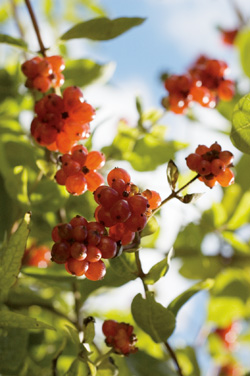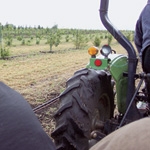
Features
Production
Research
Alberta’s first certified organic orchard opened
March 31, 2008 By Dr. Brenda Frick
The Alberta Organic Producers
Association celebrated its 15th anniversary this past July during the
grand opening of Orchard Palace, the first certified organic orchard in
Alberta, located at the farm of Victor and Elizabeth Chrapko, near Two
Hills, Alberta.
 |
| Honeysuckle berries |
The Alberta Organic Producers Association celebrated its 15th anniversary this past July during the grand opening of Orchard Palace, the first certified organic orchard in Alberta, located at the farm of Victor and Elizabeth Chrapko, near Two Hills, Alberta.
It was a day filled with celebration: Alberta’s centennial; one-third of a century for the Two Hills Agriculture Society; the opening of Orchard Palace; a visit by the board of OCIA International (a major certification body); a tribute to one of Alberta’s organic pioneers, Irene Mihailuk; and the second birthday of the youngest member of the Chrapko organic farm family.
In many ways, Orchard Palace is a model operation, although its potential is currently untapped. The fruit trees are young, many just beginning production. Rainy weather at the opening kept the field tour short, but participants did get to see saskatoons, sea buckthorn, apples, cherries, honeysuckle and strawberries.
Several guest speakers were on hand for the orchard opening, emphasizing the need for research on novel products and innovative production techniques.
Chris Neeser from Crop Diversification Centre (CDC) South suggested that producers discover what consumers want by reading cookbooks and keeping track of immigration trends. He suggested that current trends include baby vegetables, produce sporting novel colours and Asian vegetables.
Ken Fry from Olds College suggested that insect biocontrol is easier in an organic setting, where you are not killing beneficial insects with pesticides. Organic producers should focus on maintaining and enhancing the helpful insects that create balance in the insect community. He emphasized the number and variety of beneficial insects and suggested ways to encourage them, including leaving weeds and growing bug gardens to recruit helpful insects.
 Medhat Nasr, Alberta’s provincial apiarist, talked about the challenges of producing organic honey. Honey cannot be marketed as organic unless the bees’ pasture, including up to a six mile radius, is entirely organic, a condition that can very rarely be met. Organic management of hives has become more difficult with the introduction of various mites, but he did have some suggestions that can increase resistance of the bees.
Medhat Nasr, Alberta’s provincial apiarist, talked about the challenges of producing organic honey. Honey cannot be marketed as organic unless the bees’ pasture, including up to a six mile radius, is entirely organic, a condition that can very rarely be met. Organic management of hives has become more difficult with the introduction of various mites, but he did have some suggestions that can increase resistance of the bees.
Rick Sawatsky and Bob Bors from the University of Saskatchewan have worked with the Chrapkos on apple, cherry and honeysuckle research and development. Promising apple varieties have good winter hardiness and are highly prolific. Promising sour cherry varieties are sweet, dark (filled with flavour and antioxidants), and large enough to pit by machine.
Thean Pheh from CDC South spoke on a variety of aspects of orchard production. He recommends intercropping cereals in alleys between trees to tie up nitrogen and help trees harden for winter. He also suggests encouraging orchard bees who can be much more effective than honey bees. He also gave a demonstration of grafting and budding.
Organic fruit is currently in high demand and Canada’s prairie environment is home to several organic operations producing some promising fruit. The Hamilton family’s farm, located near Radisson, Saskatchewan, sells out their crop of organic you-pick apples within weeks every year. Interest in the Cherry Festival in Bruno, Saskatchewan, has also grown beyond expectation every year since its start. And there is potential for even more fresh and processing fruit, giving abundant opportunity for diversification and adding value.
Dr. Brenda Frick, Ph.D., P.Ag., is the Prairie Coordinator for the Organic Agriculture Centre of Canada at the College of Agriculture, University of Saskatchewan. She can be reached at 306-966-4975 or via e-mail at brenda.frick@usask.ca . For more information on Alberta organic see www.goingorganic.ca/ or www.albertaorganicproducers.org/. OACC newspaper articles are archived at www.oacc.info.
Print this page